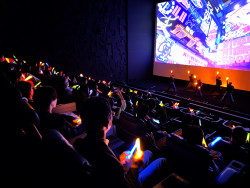
Originally published on metropolis.co.jp on June 2010
Progress is a bitch. It’s only been a year since the Japanese edition of Nintendo Magic was released, but reading its virgin English translation feels like sipping champagne that’s been left out overnight. Back in 2009, Nintendo was still riding high in the midst of the recession: profits were rising, and it was achieving record-breaking sales overseas. Last month, though, the game maker announced its first profit decline in six years—nothing devastating, but enough to deflate the celebratory air of Osamu Inoue’s paean to the company.
Nintendo Magic expands on a series of articles that Inoue wrote for Nikkei Business magazine, in which he interviewed key figures at the Kyoto-based gaming giant, including current president and CEO Satoru Iwata, game designer Shigeru Miyamoto, and former president Hiroshi Yamauchi. Such access is unusual in Marioland: the company rejects most interview requests and prefers to remain opaque about its management practices—“even eschewing praise,” as the author notes.
Inoue starts with the well-documented story of Nintendo’s most recent successes: its DS and Wii consoles, which spread the appeal of video-gaming well beyond the covens of spotty geeks with which it’s usually associated. As CEO Iwata puts it, “We realized that if we wanted to grow the gaming population, we had to build a console that no one in the family hated.” Rather than join Sony and Microsoft in their pursuit of ever more powerful hardware, Nintendo launched a pair of machines that were just fun. In the words of retired president Yamauchi, “Sony is a company where hardware leads, and software follows. Nintendo is the opposite.”
This ties in nicely with the philosophies of the late Gunpei Yokoi, Nintendo’s first development guru, who advocated “lateral thinking with seasoned technology.” Yokoi dismissed chasing technological advances as the “easy way out if you don’t have any good ideas,” and some of his greatest successes—notably the Game Boy—were considered rudimentary even when they were first released. The Wii met with similar reactions when it was launched within a month of Sony’s PlayStation 3 in 2006, but its subsequent success speaks for itself.
Inoue’s account of all this tends towards hagiography; his book might have been titled Nintendo: The Authorized Biography, so glowing is its depiction of its subject. “What kind of man is Satoru Iwata—that he can perfectly balance humility against unwavering confidence?” he ponders at one point. When he describes the first unveiling of the Wii, nothing less than bombastic will do: “The theater exploded in applause for two geniuses—Iwata and Miyamoto.” At times, the translation struggles to cope with the rhapsodic heights of his prose, rendering it in the clunky stanzas of socialist propaganda: “They [Nintendo] know the value of good fortune and the limits of effort, and leaving luck to heaven, they toil away heroically, unconcerned with the pressure they face.”
It’s a little depressing, too, that Inoue should have been given such unprecedented access yet emerge with so few compelling insights. As the first Nintendo CEO to have been appointed from outside the company’s founding family, Iwata represents a fascinating figure, but we’re never given much inkling into how this former game developer could have blossomed into such an assured manager. There’s also no mention of the backlash against the company’s products: all those stories of Wiis gathering dust after their novelty has worn off, or third-party developers struggling to produce hits for the console.
I also suspect that Inoue underestimates the threat posed by the iPhone, which has reconfigured the market in a way even more radical than what Nintendo managed, and threatens to snatch away the same “non-gaming” audience that the company so methodically courted. Progress: bit of a bitch.







